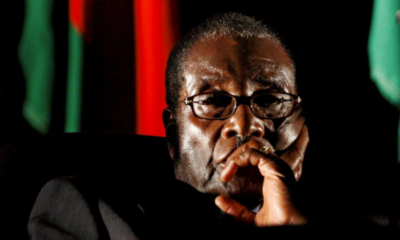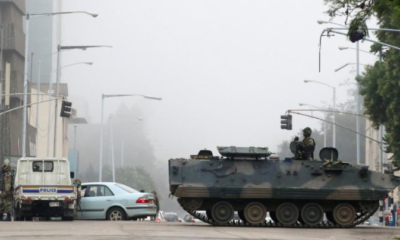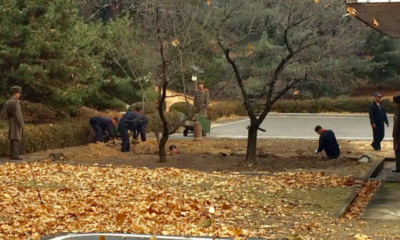Nigeria News
Nnimmo Bassey: Two Years After The UNEP Report: Ogoni Groans On
by Nnimmo Bassey
Two whole years after the United Nations Environment Programme (UNEP) issued a damning assessment of the Ogoni environment, the Ogoni people are forced to continue wallowing in the toxic broth that their lands and waters have been made to become. Ogoniland was once a land that supported productive farming, fishing and related activities. That was so up till the moment the oil-rigs began to puncture holes in the land and crude oil began to be spilled on lands, forests and rivers. The air was clean but that changed when gas flares belched like dragons out for the kill. Today, twenty years after Shell got excommunicated from Ogoni, thick hydrocarbon fumes from sundry pollutions hang in the air.
From the late 1980s, the Ogoni people raised alarm over the wholesale destruction of their environment. They followed this by careful and robustly peaceful organising. With the Ogoni Bill of Rights of 1990 they catalogued their demands for environmental, socio-economic and political justice. Although the Bill of Rights was presented to the Nigerian government till date there has not been a whisper by way of response to, or engagement with, the document.
The Bill of Rights became an organising document for the Ogoni people and also eventually inspired other ethnic nationalities in the Niger Delta to produce similar charters as a peaceful way of prodding the government into dialogue and action. The Bill noted that although crude oil had been extracted from Ogoniland from 1958 they had received NOTHING in return. We reproduce articles 15-18 of the Bill to illustrate some of the complaints of the people:
15. That the search for oil has caused severe land and food shortages in Ogoni – one of the most densely populated areas of Africa (average: 1,500 per square mile; national average: 300 per square mile.)
16. That neglectful environmental pollution laws and sub-standard inspection techniques of the Federal authorities have led to the complete degradation of the Ogoni environment, turning our homeland into an ecological disaster.
17. That the Ogoni people lack education, health and other social facilities.
18. That it is intolerable that one of the richest areas of Nigeria should wallow in abject poverty and destitution.
This Bill of Rights was the precursor to the Kaiama Declaration of the Ijaws, Ogoni Bill of Rights, lkwerre Rescue Charter, Aklaka Declaration for the Egi, the Urhobo Economic Summit Resolution, Oron Bill of Rights and other demands of peoples’ organisations in the Niger Delta.
The UNEP report of presented to the President of the Federal Republic of Nigeria on 4 August 2011 completely confirmed the claims of the Ogoni people “That neglectful environmental pollution laws and sub-standard inspection techniques of the Federal authorities have led to the complete degradation of the Ogoni environment, turning our homeland into an ecological disaster.”
The report found that, without exception, all the water bodies in Ogoni was polluted by the activities of oil companies – Shell Petroleum Development Company (Shell) and the Nigerian National Petroleum Corporation (NNPC). Indeed the report stated that some of what the people took as potable water had carcinogens, such as benzene, up to 900 times above World Health Organisation standards. The report also revealed that at some places in Ogoniland, the soil is polluted with hydrocarbons to a depth of five (5) metres.
The UNEP report revealed that the Ogoni homeland had indeed been turned into an “ecological disaster,” as the Bill of Rights asserted. We remind ourselves that the UNEP report made recommendations that most of us saw as low hanging fruits that government could easily have responded to assuage the pains of the people and commence a process of restoring the territory to an acceptable state. The apparent inaction is nothing but a squandering of opportunities to rescue a people and for impactful political action.
A total clean up of Ogoni land will take a life time or about thirty years at the least. That is the length of time UNEP estimates it would require to clean up the water bodies in the territory. And it would require an additional five (5) years to clean up the land. How is that a lifetime? Well, life expectancy in the Niger Delta stands at approximately forty-one years.
At the eve of the first anniversary of the presentation of the UNEP report, the Federal Government hurriedly cobbled up an outfit incongruously named Hydrocarbons Pollution Restoration Project (HYPREP). The project was set up basically to hoodwink the Ogoni people into thinking that action was being taken to implement the UNEP report. A year after the setting up of HYPREP under the Ministry of Petroleum Resources – a major polluter of Ogoni land – the only visible acts of implementation of the UNEP report has been the planting of sign posts at some places informing the people that their environment is contaminated and that they should keep off. You could almost laugh, but this is sad and serious. Keep off your environment! No options given. The people still drink the polluted waters and farm the polluted lands. Seafood is still being scrounged from the polluted waters and community people still process their foods in the crude-coated creeks.
Two years after the UNEP report, we believe that it is not too late for the government to act. President Jonathan can
• Declare Ogoni land an ecological disaster zone and invest resources to tackle the deep environmental disaster here.
• Urgently provide potable drinking water across Ogoni land
• Commission an assessment of the entire Niger Delta environment. An assessment or audit of the environment of the entire nation should equally be on the cards urgently.
• Those found guilty of crimes against the people and the environment should be brought to book and made to pay for their misdeeds. Blame for oil thefts must go beyond the diversionary focus on the miniscule volumes taken up by bush refiners. The major crude oil stealing mafias must be uncovered. Crude oil and gas volumes must also be metred as demanded by groups such as the Environmental Rights Action (ERA).
• Engage in dialogue with the Ogoni people as to the time-scale and scope of actions to be taken to restore the environment. Issues raised in the Ogoni Bills of Rights and the UNEP report provide good bases for dialogue. Extend this all over the Niger Delta.
• Ensure that the actions to tackle the ecological disaster that the Niger Delta has become are not seen as opportunity for patronage or jobs for the boys. UNEP should play a key oversight role, to ensure quality and to build confidence in the process.
• The body to tackle the problem should be domiciled in the Ministry of Environment and should not by any means be under the polluting Petroleum Resources Ministry.
• Shell should be ordered to urgently dismantle whatever remains of their facilities in Ogoni land along with toxic wastes they dumped in the territory.
• Shell should also be required to replace the Trans Niger Delta pipeline that carries crude oil from other parts of the region across Ogoni territory.
• Clean up the polluted lands and waters.
These are just some of the steps that must be taken urgently. The UNEP report gives a good list of several things that need to be done. The time has come to halt the ostrich posture and to face the national environmental challenges squarely. Two years is long enough. Our peoples have patiently lined up to fall into early graves. Twenty-three years ago several Ogoni people were sacrificed because they dared to speak up concerning the state of their homeland.
A stanza of the Nigerian National Anthem urges, “The Labours of our heroes past shall never be in vain.” We cannot continue to sing those lines mindlessly while the ecological disaster persists and our heroes groan in their graves.
_______________________
Nnimmo Bassey is an award-winning Nigerian environmentalist and activist.
——————————————————————————————————————————————-
Posted in Nigeria News. A DisNaija.Com network.
Source: Citizens Platform
DisNaija.Com publishes regular posts on Nigeria News, Nigerian Newspapers, Online Nigeria Gist.
Follow us on Twitter and Facebook.
Nigeria News
Follow @Dis_Naija
Your Opinion Counts. Be sure To Leave A Comment, If You Have Any.
Please Like, Share or Tweet. Your Support Is Appreciated.

Nigeria News
Kano Transfers Over 1,000 Almajiris To Different States Amidst COVID-19 Pandemic

The Kano State Government on Saturday said it has transferred 1,098 ‘almajiris’ to different states of the country.
The commissioner for local government, Murtala Garo, disclosed this while presenting a report before the state’s task force on COVID-19 at the government house, Kano.
Almajiris are children who are supposed to be learning Islamic studies while living with their Islamic teachers. Majority of them, however, end up begging on the streets of Northern Nigeria. They constitute a large number of Nigeria’s over 10 million out-of-school children.
Mr Garo said the Kano government transported 419 almajiris to Katsina, 524 to Jigawa and 155 to Kaduna. He said all of them tested negative for coronavirus before leaving the Kano State.
Despite the coronavirus test done in Kano for the almajiris, the Jigawa government earlier said it would quarantine for two weeks all the almajiris that recently arrived from Kano.
Mr Garo said another 100 almajiris scheduled to be taken to Bauchi State also tested negative to COVID-19.
In a remark, Governor Abdullahi Ganduje said the COVID-19 situation in Kano was getting worse. He appealed for a collaborative effort to curtail the spread of the virus in the state.
Mr Ganduje, who commended residents for complying with the lockdown imposed in the state, said the decision was taken to halt the spread of the virus.
Kano State, as of Saturday night, has 77 coronavirus cases, according to the Nigeria Centre for Disease Control.
The decision to transfer the Kano almajiris is part of the agreement reached between Northern governors that almajiris in each state be transferred to their states of origin.
However, even before the latest agreement by the governors, the Kano government had been transferring almajiris to other states and neighbouring countries after it banned street begging in the state, most populous in Northern Nigeria.
Despite the transfers, however, no concrete step has been taken to ensure such children do not return to Kano streets as there is freedom of movement across Nigeria although interstate travel was recently banned to check the spread of the coronavirus.
Sourced From: Premium Times Nigeria
Nigeria News
COVID-19: ‘Bakassi Boys’ Foil Attempt To Smuggle 24 Women Into Abia In Container

By Ugochukwu Alaribe
Operatives of the Abia State Vigilante Service, AVS, popularly known as ‘Bakassi Boys’ have arrested 24 market women hidden in a container truck, at Ekwereazu Ngwa, the boundary community between Abia and Akwa Ibom states.
The market women, said to be from Akwa Ibom State, were on their way to Aba, when they were arrested with the truck driver and two of his conductors for violating the lockdown order by the state government.
Driver of the truck, Moses Asuquo, claimed he was going to Aba to purchase stock fish, but decided to assist the market women, because they were stranded.
A vigilante source told Sunday Vanguard that the vehicle was impounded while the market women were sent back to Akwa Ibom State.
Commissioner for Home Land Security, Prince Dan Okoli, who confirmed the incident, said that smuggling of people into the state poses great threat to the state government’s efforts to contain the spread of COVID- 19.
Sourced From: Vanguard News
Nigeria News
Woman Kills Her Maid Over Salary Request

Operatives of the State Criminal Investigation and Intelligence Department (SCIID), Yaba of the Lagos State police command have arrested one Mrs Nene Steve for allegedly killing her maid, Joy Adole
The maid was allegedly beaten to death by Nene for requesting for her salary at their residence located at 18, Ogundola Street, Bariga area in Lagos.
Narrating the incident, Philips Ejeh, an elder brother to the deceased said that he was sad when they informed him that his sister was beaten to death.
He explained that the deceased was an indigene of Benue State brought to Lagos through an agent and started working with her as a maid in January 2020.
‘’She reported that her boss refused to pay her and anytime she asked for her salary she will start beating her.
She was making an attempt to leave the place but due to the total lockdown she remained there until Sunday when her boss said she caught her stealing noodles and this led to her serious beating and death,’’ Ejeh said.
He called on Lagos State Government and well- meaning people in the country to help them in getting justice for the victim.
The police spokesman, Bala Elkana, stated that the woman and her husband came to Bariga Police Station to a report that their house girl had committed suicide.
Detectives were said to have visited the house and suspected foul play with the position of the rope and bruises all over the body which confirmed that the girl had been tortured to death and the boss decided to hang up the girl to make it look like suicide.
He said: “The police moved on with their investigation and found a lot of sign of violence on her body that she has been tortured before a rope was put on her neck.’’
He added that the police removed the corpse and deposited it in the mortuary for autopsy to further ascertain the cause of the death.
Elkana said the matter has been transferred from Bariga police station to Panti for further investigation while the couple have been arrested and will be charged to court.
Tribune
Boko Haram Attacks: Buhari Summons Urgent Meeting Of Service Chiefs

Ostensibly alarmed by the latest killings of dozens of soldiers by Boko Haram insurgents, President Muhammadu Buhari has summoned an urgent meeting of Service Chiefs to find ways to stop the trend.
He has also dispatched the Minister of Defence, Mansur Dan Ali, to the neighbouring Republic of Chad for an urgent meeting with President Idris Deby and his defence counterpart.
Knowledgeable sources said in Abuja on Friday that the president is worried by on the deterioration of security situation on the Nigeria – Chad Border that has led to the recently increased Boko Haram terrorism in the area.
The sources which did not want to be named in Abuja said: “Nigeria has a Chad problem in the Multi-National Joint Task Force (MNJTF) put together to secure the Lake Chad basin areas and repeal the Boko Haram terrorist attacks against all the countries neighbouring the Lake.”
The sources noted that Chad is believed to be having their own internal security challenges and this has reportedly led to their pulling away their own troops manning their own border around Lake Chad, saying: “That lacuna is being exploited by the Boko Haram terrorists, who go in and out of Nigeria, Niger and Cameroon to launch terrorist acts. This is a clear illustration of the fact that terrorism is beyond national borders.”
When contacted, the Senior Special Assistant to the President on Media and Publicity, Garba Shehu, confirmed that the Defence Minister is going to Chad but said he is unaware of the purpose.
Meanwhile, the military authorities are said to be in the process of identifying the families of the latest victims with a view to making contact with them.
Credible sources revealed that it is the reason the president is yet to make any pronouncement on the matter.
“The President has called an urgent meeting with the Service Chiefs, as well as the fact that families of the latest victims of the Boko Haram are being identified and contacts made before a government pronouncement on the tragic attacks. This, it is understood, is the reason for the silence of the government over the incident,” the source said.
Sourced From: Tribune






















